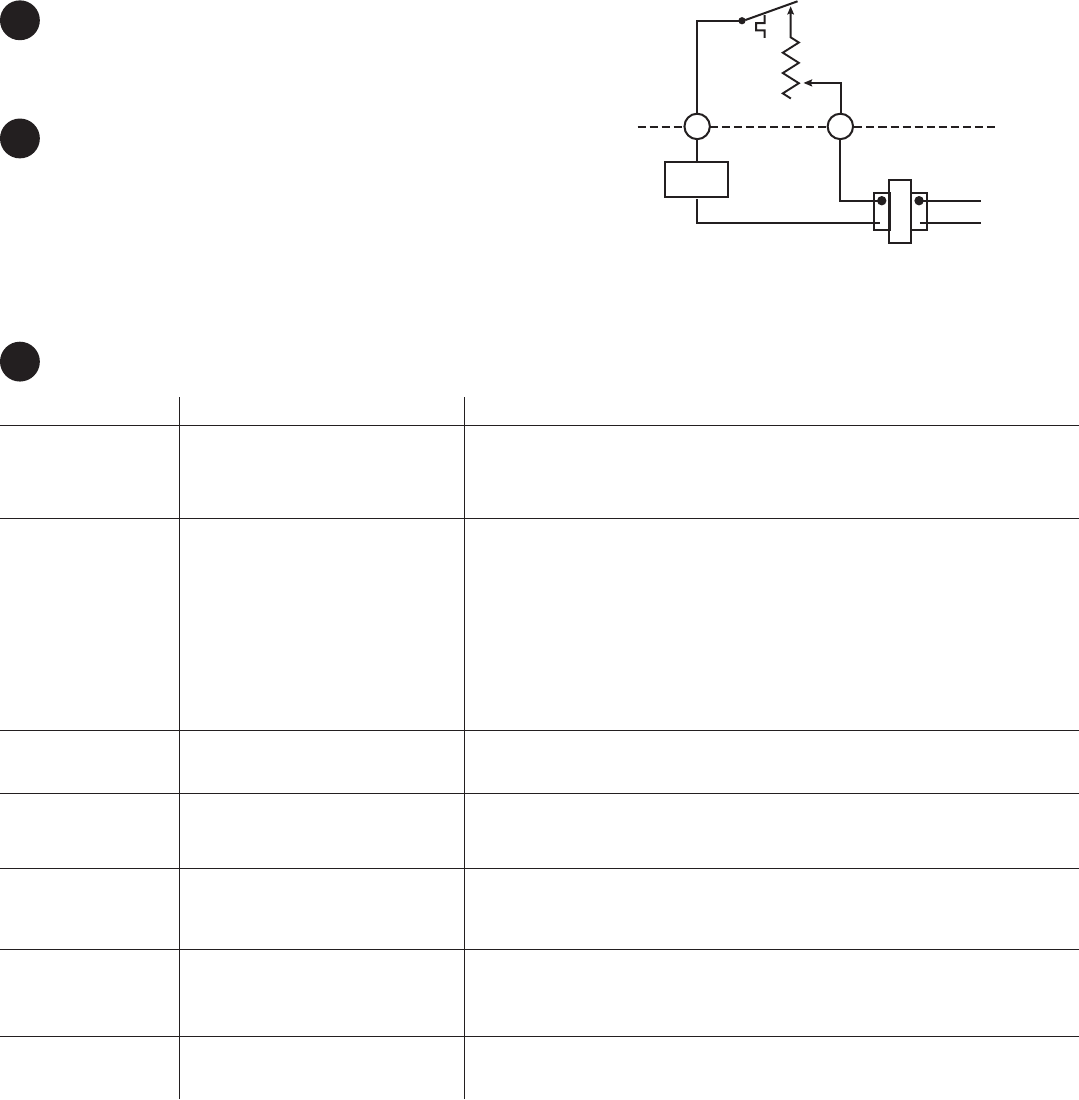
7
6
8
NEW THERMOSTAT OPERATION
This thermostat is easy to operate. After power is turned on, raise temperature abo-
ve room temperature to turn the heating system on. Lower temperature below room
temperature to turn heating system off.
SPECIFICATIONS
ELECTRICAL DATA
Switch Rating...................................... 24 VAC (30 VAC max.)
Heating.................................................. 0.15 to 1.2 Amps
Anticipator Rating:
Heating.................................................. Adjustable from 0.15 to 1.2 Amps
THERMAL DATA:
Temperature Range............................. 50°F to 90°F (10°C to 32°C)
Operating Humidity Range................. 0 – 90% noncondensing
TROUBLESHOOTING
WR
Heat
Anticipator
(adjustable)
Heating
System
24 VAC 120 VAC
Hot
Neutral
THERMOSTAT
SYSTEM
Figure 3. Typical wiring for single transformer heating system
The Emerson logo is a
trademark and service mark
of Emerson Electric Co.
Symptom Possible Cause Corrective Action
No Heat/ No Fan
(common problems)
1. Blown fuse or tripped circuit breaker.
2. Furnace power switch to OFF.
3. Furnace blower compartment door or
panel loose or not properly installed.
Replace fuse or reset breaker.
Turn switch to ON.
Replace door panel in proper position to engage safety interlock or door switch.
No Heat
1. Pilot light not lit.
2. Broken or melted anticipator wire.
3. Loose connection to thermostat or
system.
4. Thermostat or heating system requires
replacement or service.
5. Setpoint temperature below room
temperature.
Re-light pilot.
Excessive current or dead short in system. Have a qualifi ed service person check the system
before replacing thermostat.
Verify thermostat and system wires are securely attached.
Your furnace manufacturer or service person can describe how to test the heating system to
verify it is operating correctly. If the heating system is capable of operation and the no heat
condition persists, replace the thermostat.
Raise temperature above room temperature.
Intermittent Heat
1. Furnace Lock-Out Condition Many furnaces have safety devices that shut the system down when a lock-out condition
occurs. If the heat works intermittently contact the furnace manufacturer or local service
person for assistance.
Heat or Fan Runs
Constantly.
1. Possible short in wiring.
2. Possible short in thermostat.
3. Possible short in heat/cool/fan system.
Check each wire connection to the thermostat to verify it is neatly looped under the terminals.
No extra wire should stick out from under the terminals.
Furnace Cycles Too
Fast or Too Slow
(Narrow or wide
temperature swing)
See Step 5, Adjusting the Anticipator. The anticipation setting is the only adjustment that effects the heating cycle rate. If an
acceptable cycle rate is not achieved using the anticipator contact a local service person for
additional suggestions. The location of the thermostat, size of the Heat/Cool System and
current draw can infl uence the cycle rate.
Thermostat Setting
and Thermostat
Thermometer Disagree
1. Thermostat thermometer setting
requires adjustment.
2. Thermostat setting lever requires
calibration.
The thermometer can be adjusted by using a standard slotted screwdriver. Turn the
thermometer pointer screw located inside the front cover to change the setting. For calibrating
the setting lever contact a local heating and cooling service person.
Adjusting Thermometer
1. Thermostat thermometer disagrees
with other room thermometers.
The thermometer on the thermostat is accurately calibrated at our factory but you can adjust
it by using a standard slotted screwdriver. Turn the thermometer pointer screw located inside
the front cover to change the setting.
